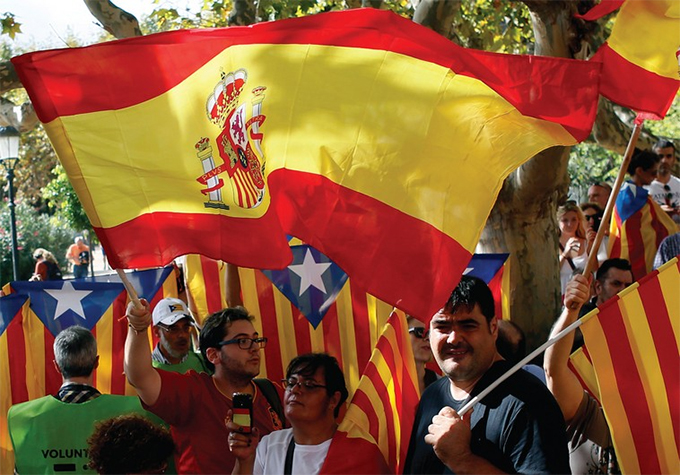

Barcelona: Catalan separatists said independence was within their reach before Sunday's regional election. But following their narrow victory, a rocky road lies ahead for those wanting to break away from Spain.
To push on with a declared "roadmap" to independence, separatist groups must now overcome wide differences and the opposition of a large chunk of the electorate.
In such circumstances, the plan to press for independence by 2017 is of "dubious practicality", political scientist Josep Ramoneda wrote.
Sunday's election was historic in that it yielded the first ever regional parliamentary majority for pro-independence parties in the rich northeastern region.
But under the electoral system the two groups fell short of a popular majority with just under 48 percent of the vote between them.
The lack of a clean majority of votes is a powerful argument for sceptics.
"You cannot declare an independent state when half the population is loyal to the neighbouring state," said Fernando Vallespin, a political scientist at Madrid Regional University.
"Independence looks impossible to me, because there is not a majority of society that is willing to take that step".
The separatists nevertheless declared they had enough support to justify moving towards independence.
"There are not as many of us as we would have liked, but I trust that we will end up gaining the extra support we are lacking," nationalist regional president Artur Mas said on Wednesday.
Under a "roadmap" published before the election, Mas's alliance plans to move to independence within 18 months.
The regional parliament would declare the start of the secession process and leaders would propose negotiations with the central government and European institutions.
They would then set about preparing Catalonia's own state institutions.
In 2017 they would proclaim independence and call elections for a new parliament which would draw up a constitution.
'We cannot fail'
First of all however, the groups must choose a regional president to lead the process.
The first round of voting for that is due by November 9 at the latest and Mas does not have the support he needs to be re-elected.
His Together For Yes alliance gained 62 parliamentary seats and the radical left-wing secessionist group CUP won 10, giving them an absolute majority if they join forces.
Together For Yes, grouping centre-right, centre-left and independent left-wing parties and civil groups, is a volatile mix even without CUP.
What's more, CUP refuses to accept Mas as leader since he is widely despised for presiding over austerity cuts in the economic crisis.
"The independence movement is very broad," Ramoneda told AFP.
"Sooner or later, the differences will start to show. Eighteen months could be enough to destroy this government."
CUP has stated two firm conditions for its support: an emergency social aid programme for the poor, and a consensus leader other than Mas.
Mas pleaded for an accord. "We cannot have not come this far to ruin it all now," he said. "We cannot fail."
The roadmap also raises the possibility of a full referendum on independence -- a move fiercely resisted so far by Spain's central government.
If rival parties force out Prime Minister Mariano Rajoy in a general election in December, the Catalans could have a new government in Madrid to negotiate with.
Vallespin said no Spanish government was likely to agree to independence, which is prohibited by the constitution.
But Catalonia could end up securing a symbolic recognition of its nationhood and greater fiscal powers -- both demands that Madrid has rejected in the past.
"It is a complicated issue," said Vallespin. "But it will end in negotiation."
AFP




